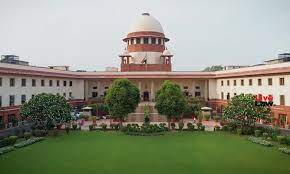The only question to be decided by us here is whether the Trial Court and the High Court have rightly referred the matter to arbitration or the dispute is of such a nature that it is not liable to be referred to arbitration, as there was no arbitration clause in the Conveyance Deed dated 17.12.2019 or if there was, yet the matter in any case is such that it is not arbitrable. (Para 2)
In the present case, the 2007 as well as the 2008 Tripartite Agreement, forms the basis for all subsequent agreements, conveyance, etc. The arbitration clause is also very wide in its scope, as we have already seen. At the sake of repetition, the 2008 Tripartite Agreement states that “any dispute, in relation to these agreements or in relation to any matter touching or arising from this Agreement, shall be referred to arbitration. (Para 8)
The contention of the appellants therefore that the dispute raised in the civil suit is non- arbitrable is also not correct. The dispute relates to a property which is the subject matter of the two tripartite agreements dated 31.03.2007 and 25.07.2008. (Para 8)
In the present case there are broadly three objections of the appellants on the Section 8 application moved by the respondents which has already been allowed by the two courts below. The first objection regarding the absence of an arbitration clause in the Conveyance Deed dated 17.12.2019 and the development agreements has already been discussed in detail in the preceding paragraphs. (Para 18)
The second is that the suit filed by the appellants is for cancellation of a document relating to immovable property i.e. land and it therefore amounts to an action in rem and hence arbitration is not the remedy. This question however, is no more res integra. Elaborate analysis on this aspect has been done by this Court in the case of Deccan Paper Mills v. Regency Mahavir Properties, (2021) 4 SCC 786, therein this court after referring to all the relevant precedents and the case laws has held that whether it is a suit for cancellation of a deed or a declaration of rights rising from the deed, it would only be an action in personam and not in rem. The decision of the Division Bench of Andhra Pradesh High Court in Aliens Developers (P) Ltd. v. Janardhan Reddy, 2015 SCC Online Hyd 370, was held to be wrong wherein it was held that a suit under Section 31 of Specific Relief Act amounts to an action in rem and this adjudicatory function can only be done by the Competent Civil Court and the powers cannot be exercised by an Arbitrator. The basic foundation of the Court for holding that a Section 31 suit for cancellation of a document amounts to an action in rem was held to be wrong. The entire scope and ambit of the Specific Relief Act, 1963 was considered and in Deccan Paper Mills (supra), the anomalies in law for holding such to be an action in rem were discussed and it was held that a relief sought under the Specific Relief Act is nothing but an action in personam. (Para 19)
The third objection is regarding fraud. The plea of fraud raised by the appellants in their objection to the Section 8 application has never been substantiated. Except for making a bald allegation of fraud there is nothing else. This Court has consistently held that a plea of fraud must be serious in nature in order to oust the jurisdiction of an Arbitrator. In Rashid Raza v. Sadaf Akhtar, (2019) 8 SCC 710, this Court laid down two conditions which must be satisfied before the Court can refuse to refer the matter to the Arbitrator, a forum consciously decided by parties in an agreement. The first is whether the plea permeates the entire contract and above all, the arbitration agreement, rendering it void or secondly, whether the allegation of fraud touches upon the internal affairs of the parties inter se having no implication in the public domain. The allegations must have some implication in public domain to oust the jurisdiction of an Arbitrator, if an allegation of fraud exists strictly between the parties concerned, the same will not be termed to be as a serious nature of fraud and hence would not be barred for arbitration. (Para 20)
SUPREME COURT OF INDIA
2023 STPL(Web) 489 SC
[2023 INSC 1081]
Sushma Shivkumar Daga & Anr. Vs. Madhurkumar Ramkrishnaji Bajaj & Ors.
Civil Appeal No. 1854 of 2023-Decided on 15-12-2023
https://stpllaw.in/wp-content/uploads/2024/01/2023-STPLWeb-489-SC.pdf







